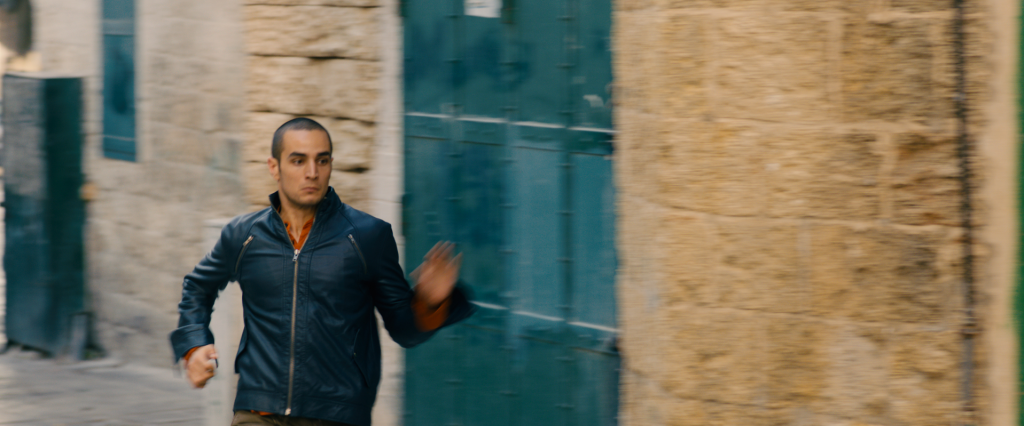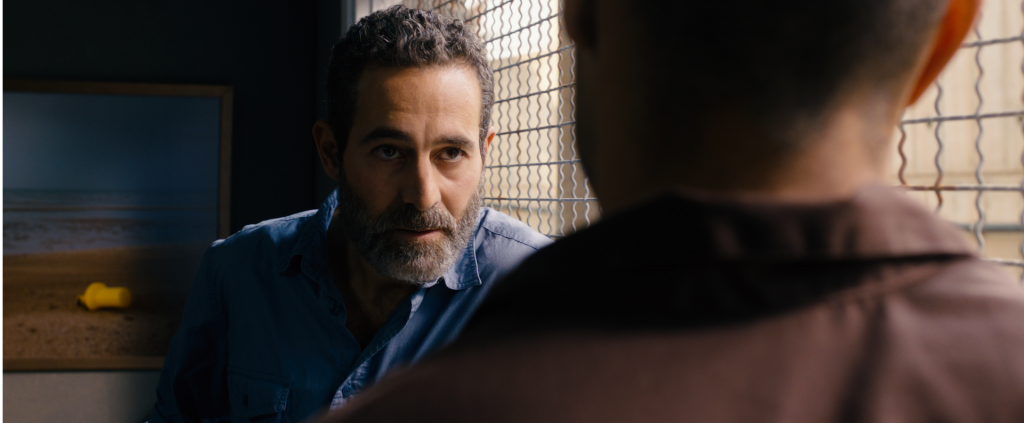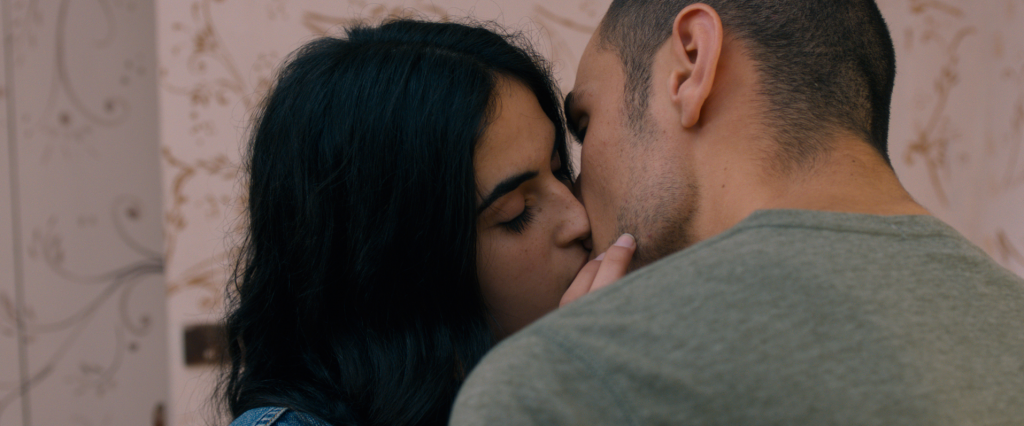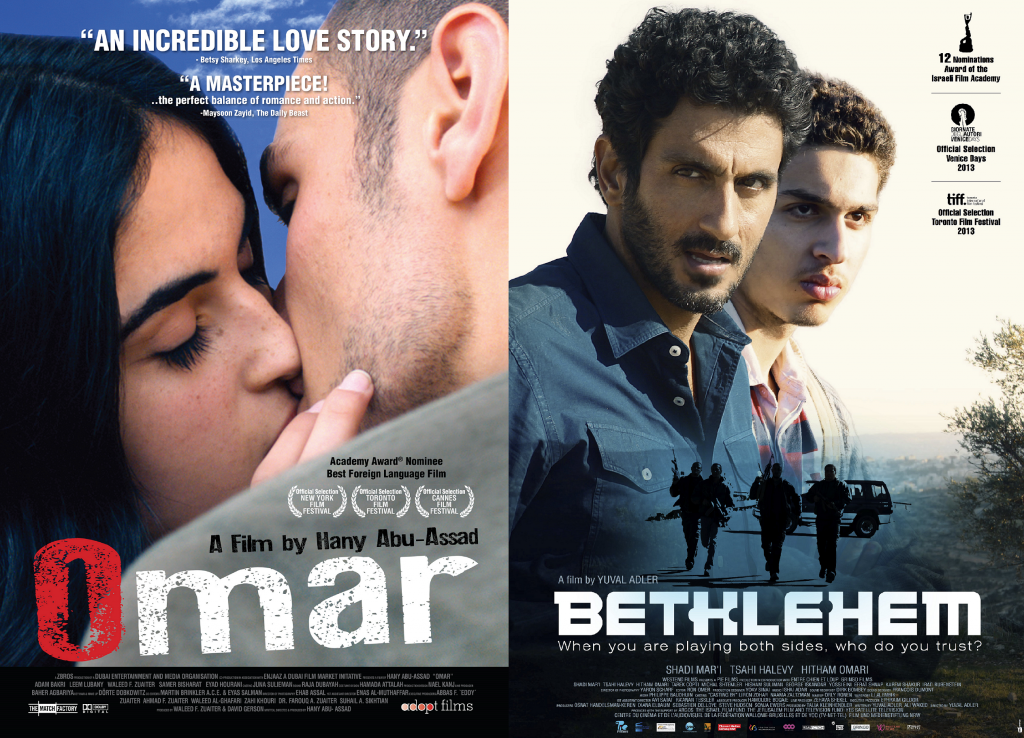Two new films explore the complexity of Israeli-Arab and Palestinian identity. One is propaganda, the other much more artful. Which do you think got the Oscar nod?
The Academy of Motion Picture Arts and Sciences’ rules for Best Foreign Language Film provide that each “country” makes a single submission. This year there were 76 submissions—a record. An Academy committee reduced them to a nine-film shortlist, and a second committee chose five nominees, from four countries and one non-country: Belgium (The Broken Circle Breakdown), Cambodia (The Missing Picture), Denmark (The Hunt), Italy (The Great Beauty), and “Palestine” (Omar). The rules also require that a film be first released in the country submitting it. In the past year, Omar has been released in Europe and the United States, but not in “Palestine.”
The Academy bent its rules in the case of Omar, but the nomination presents issues even more important than the rule violations. This essay examines why Omar is characterized as a “Palestinian” film, and what it shows about whether “Palestine”—if it ever actually becomes a country—can live side by side in peace and security with Israel. It also takes a look at a second new film, Bethlehem, which is nearly identical in plot, quality, and in the questions it raises, and whose exceptional artistic merit makes the specific choice of Omar all the more unfathomable.
The synopsis of Omar by Adopt Films, the movie’s U.S. film distributor, is as follows:
Omar is accustomed to dodging surveillance bullets to cross the separation wall to visit his secret love Nadia. But occupied Palestine knows neither simple love nor clear-cut war. On the other side of the wall, the sensitive young baker Omar becomes a freedom fighter who must face painful choices about life and manhood. When Omar is captured after a deadly act of resistance, he falls into a cat-and-mouse game with the military police. Suspicion and betrayal jeopardize his longtime trust with accomplices and childhood friends Amjad and Tarek, Nadia’s militant brother. Omar’s feelings quickly become as torn apart as the Palestinian landscape. But it’s soon evident that everything he does is for his love of Nadia.
In evaluating Omar as a Palestinian film, consider these facts: The film’s screenwriter and director is Israeli. The actor playing the lead role was born in Israel and attended Tel Aviv University before moving to New York. The actress playing the beautiful Nadia is a 16-year-old born in Israel. The actor playing the key role of Omar’s friend Amjad is another 16-year-old born in Israel. Most of the movie was made in Israel (six of the eight weeks of filming). Moreover, Israel allowed the filmmaker to shoot wherever he wanted—he says “we managed to get permission for all of the places, even the wall,” which functions as a virtual character in the movie (featured prominently in the film’s poster, symbolically holding the young lovers apart).
The very existence of this film is a tribute to Israel—a country where a movie about “occupied Palestine” (a.k.a. the disputed territories of Judea and Samaria), and the “separation wall” (a.k.a. the “security barrier” that in most places is not a wall but a fence) can be made freely, not only without governmental opposition, but with explicit governmental permission.

Omar (Adam Bakri) is on the run from Israeli agents who are pursuing the Palestinian murderer of an Israeli soldier. Photo: Adopt Films
So why is Omar treated as a film from the non-country of “Palestine,” rather than the real country of Israel? The answer, we will see, is complicated.
To address the question, it may help to recall the old riddle about the patient wheeled in for emergency surgery, where the doctor looks down and exclaims, “Oh my God, that’s my son!” The doctor is correct, but it is also correct that the doctor is neither the patient’s father nor his stepfather. How is that possible? Who is the doctor?
Answer: the doctor is his mother.
People puzzled by the riddle assume the doctor must be male, which was a common assumption back when the riddle was new. Similarly, in the case of Omar, people might reasonably assume that a movie with an Israeli screenwriter, Israeli director, Israeli principal actors, made principally in Israel, and facilitated by the Israeli government, must be an Israeli film. But the screenwriter, director, and principal actors in Omar are Israeli Arabs, and they consider themselves Palestinians, not Israelis.
The mistaken assumption in the doctor riddle reflects unconscious sexism. The assumption that a movie written, directed, and acted by Israelis, and made mainly in Israel, is an Israeli movie, on the other hand, is not mistaken. The film is no less Israeli simply because the Israelis who made it are Israeli Arabs. Israel is a country where Arabs have full civil and religious rights hold seats in the Knesset, serve on the Supreme Court, and can make a film like Omar without fear of reprisal. The surprise is not that the film was made in Israel. The surprise is that the Israelis who made it do not consider themselves Israelis.
Omar’s screenwriter/director is Hany Abu-Assad, born in 1961 in Nazareth, Israel. He lives there along with his extended family, and carries an Israeli passport. He has been making films since 1998, including Nazareth 2000 (a documentary), Rana’s Wedding (set in Jerusalem), and Paradise Now (a 2005 film about two would-be suicide bombers that was nominated for an Oscar and credited to “The Palestinian Territories,” though the Academy’s official production notes for the film listed only France, Germany, Holland and Israel).
In the U.S. press materials for Omar, Abu-Assad asserts that his focus as a filmmaker is “interesting and powerful films” with characters “whose motivations are both timeless and placeless.” He says that if his work affects people’s understanding of anything else, “this is a side issue” that is unrelated to his artistic endeavor:
More than anything else, I find that I am praised and/or criticized for giving a voice to the Palestinian case, but this is not artistic commentary nor criticism. It is political commentary and criticism, which is wholly different.
The Los Angeles Times quoted Abu-Assad earlier this year as saying he thinks the Israeli-Palestinian conflict will eventually end, and that “you want to make a movie that survives the conflict, after 20 years or 100 years still seems a good movie. That is why I think really the film is not about the conflict; it’s really about love, friendship, and betrayal and about the genre thriller.” In the film’s press materials, he attributes the movie’s origin to a conversation in Ramallah several years ago, followed by a middle-of-the-night writing binge:
I was having tea with a good friend who told me the true story of being approached by a government agent with personal information. At that time, the government agent used this secret in an effort to make my friend collaborate. Upon hearing this, I immediately knew I had to delve into this subject; to explore how such circumstances and actions would affect love, friendship, and trust. After some reflection, I found myself unable to sleep one night and in that moment I pulled out a pad of paper and four hours later I had the exact structure of what Omar is today.
Elsewhere, Abu-Assad has said Omar was inspired by Shakespeare’s Othello: “The problem of Othello was his insecurity … [which makes] you start to believe the unbelievable,” and which leads, he says, to paranoia, exacerbated by powerlessness. He rejects criticism of Omar from Almagor, an Israeli organization representing victims of Palestinian terror, by saying the film “is really about what happens in your friendship and love, when you do actions that can affect that, how you do the balance between your duty and desire.”
That is how Abu-Assad and the U.S. distributor have presented the movie to Western mainstream audiences. In other places, however, he presents a much different portrait of his cinematic efforts.
In a 2010 interview in The Electronic Intifada with a Beirut-based journalist and filmmaker, Abu-Assad set forth a more straight-forward explanation of his cinematic efforts, which dealt with something other than timeless and placeless themes of love, friendship and trust:
Sabah Haider: How would you define Palestinian cinema?
Hany Abu-Assad: Since 1948 we are a resistance movement and keeping the case alive is a form of resistance. Making these films is like unconsciously making documents that can be kept in history and keep your case alive. It’s a way of resistance.
The striking point about Abu-Assad’s answer is not simply the definition of Palestinian cinema as a “resistance movement,” but the reference to the cinematic resistance as part of a continuing effort that began in 1948. Not 1967.
In other words, for Abu-Assad, the “occupation” is not a reference to the Six Day War in 1967, but to the 1948 one that marked Israel’s creation. He believes that “in Jerusalem both sides are occupied.” He lists his birthplace as “Nazareth, Palestine,” although Nazareth has been part of Israel since 1949. He describes himself as “100% Palestinian.” At a Tel Aviv screening of Omar, he declined to speak Hebrew; at Cannes, he told an interviewer “It’s not my job to give hope for reconciliation.”
The underlying political cause of Palestinian cinema is not a Palestinian state in the “Palestinian Territories,” but one from the river to the sea. It is a cause that has continued even after Israel offered the Palestinians a state on substantially all the “Palestinian Territories,” with a capital in Jerusalem, not once but three times—and got in response a barbaric terror war on Israeli citizens in nightclubs, restaurants, hotels, schools, buses, and cars, ending only after the security barrier was installed, and got multiple rocket wars on Israeli civilians from Gaza after every Israeli settler and soldier was withdrawn.
Asked by Sabah Haider about “the themes that bind Palestinian films together” (“resistance, trauma, statelessness and a longing for the return to Palestine, the right to return”), Abu-Assad responded as follows:
For sure the dominant one is trauma. The right to return, let’s say, is absolutely dominant, but the trauma is part of that because the solution to the trauma is the right to return. Trauma is a consequence of the Nakba [the “catastrophe” of 1948]. After that you resist, you keep the spirit alive, you keep the case alive … you insist on the right of return—it’s a big thing happening to you … Even after we get our rights back, we still have to recover from that trauma.
If a trauma cannot (according to Abu-Assad) be fully assuaged even by a “right of return” to “Palestine,” a Palestinian state limited to the West Bank and Gaza is obviously no remedy. Such a state might alleviate the trauma of 1967—the one resulting from the attempt that year to destroy Israel—but it would not alleviate the trauma from 1948, when the first such effort to destroy the Jewish state was commenced with a five-state Arab invasion the day it was established.
In a separate 2010 article about the “new wave of Palestinian filmmakers,” Haider concluded Palestinian films were “inherently political.” They are intended as “a cultural weapon” to delegitimize a Jewish state. Nowhere in the article or interview did she or Abu-Assad mention a two-state solution, for obvious reasons: a “two-state solution” is not what Palestinian cinema seeks.
As a central figure in Palestinian cinema, Abu-Assad’s views are hardly those of an outlier, as one can tell by reading academic literature on Palestinian films. Columbia University professor Hamid Dabashi, in his introduction to a 2006 volume of essays (Dreams of a Nation: On Palestinian Cinema), writes that the “paramount feature” of Palestinian cinema is a “sublated violence … [and] an aestheticized violence,” arising from the Nakba. The academic adjectives reflect his belief that the films arise from the “crime of 1948” — also known as the creation of Israel. He writes that Haifa is “occupied territory.”
Columbia professor Joseph Massad, writing in the same volume, describes Palestinian cinema as “integral to Palestinian resistance” against “the Zionists’ original sin”—another circumlocution for the creation of Israel. He considers the Oslo peace process a “capitulation.” Palestinian films are thus, in Prof. Dabashi’s words, “central parts” of a “Palestinian cinematic arsenal,” used as “weapons of resistance in the international arena.” They combine “images of resistance and oppression” with “images of frustrated and impossible love stories” to use the fictional stories both as metaphors and as vehicles for presenting inflammatory pictures staged to generate maximum outrage in Western audiences.
So is Omar really a story about “timeless and placeless” characters trying to balance “duty and desire” in which “everything [Omar] does is for his love of Nadia” in an updated Shakespearean tragedy? Or is Omar part of a movement using cinema as a “cultural weapon,” challenging Israel’s existence as a Jewish state, seeking a “return” to the time before Israel was established, using an art form and a message geared specifically for the international community?
In other words, did the Academy issue a coveted Oscar nomination for a work of art, or one of agitprop?
Let’s take a closer look at Omar, and delve a little more deeply into its story, beyond Abu-Assad’s English-language descriptions and the U.S. distributor’s synopsis for the American press.
Omar is a young Palestinian whose day job is to bake pita bread in an open kiln. His girlfriend lives on the other side of the huge wall, which is the recurring image of the film. The wall dwarfs him; sometimes he looks longingly up at it; other times he scales it and gets shot at; sometimes it is just too difficult to climb and makes him cry. He is harassed and insulted by Israelis as part of his daily life. After one scaling attempt, four Israeli soldiers drive up in a van while he is walking alone on the street; they humiliate him, making him stand on one leg while they repeatedly insult him with sneering, sarcastic sadism.
When he is not baking bread or trying to see his girlfriend, Omar and his two friends are training to kill Israelis, as part of a larger terrorist group. The girlfriend is the sister of the leader of Omar’s cell, and Omar needs to prove himself worthy to marry the sister. The three go out one night to assassinate an Israeli soldier, relaxing casually at his post, by firing a sniper’s bullet from the dark. Omar helped prepare the mission, although he turns slightly unenthusiastic at the last moment and is not the one who actually pulls the trigger. Afterwards, he gets hunted down by brutal Israelis; is thrown into prison where he is hung naked by his arms while beaten; is tortured more brutally than anything seen in Zero Dark Thirty; and is placed in solitary confinement for weeks. The Israelis are hell-bent to find the guy who pulled the trigger.
Omar tells a fellow inmate he will never confess; the inmate turns out to be an informer, and smirking Israelis inform him in the next scene that “under Israeli military law” a statement that you won’t confess is a confession. Omar consults his Palestinian lawyer, who tells him he is looking at a “minimum” of 90 years in jail if he doesn’t collaborate. He asks the lawyer if there is any way out, and the lawyer delivers the message of the movie: “not under the occupation.”

Rami (Waleed F. Zuaiter), an Israeli intelligence operative, makes a deal to free Omar from a long prison sentence in exchange for becoming a double agent. Photo: Adopt Films
So Omar agrees to collaborate, is released from prison, and is given one month to bring back the Palestinian who actually pulled the trigger. We are supposed to believe that the Israeli secret service that easily tracked Omar down can’t find his two friends without a collaborator created through brutal physical and psychological torture. For the rest of the film, Omar moves among his friends without turning them in, but they are suspicious of him (how did he get out of jail so quickly?). He tries to be with his girlfriend, but she is suspicious too. Omar stands by as she marries one of his friends, who is distinctly less appealing than he is, and who apparently courted her behind Omar’s back. Ironically, the lucky guy is the friend who pulled the trigger. The guy who killed the Israeli got the girl, get it?
For most of the film, Omar has a furrowed brow, overwhelmed by the situation in which he finds himself. Will he actually collaborate, or won’t he? What can he do, if anything? What is next after losing the girl? It will not spoil the drama to note that by the end of the film he has effectively become a suicide bomber.
Omar is in many ways a well-made film. It features a love story, action, melodrama, humor, and some affecting performances, all in a fast-paced 98 minute movie (although two key scenes are repeated twice for no apparent reason). The production values of the film are good, if you do not inquire too deeply into what is being produced. The movie is the work of an assured filmmaker, and the reviews have been largely favorable. But one of the dissenting reviews, by Nick Schager in the Village Voice (not generally considered a Zionist organ), captures the essence of the film:
While Omar and his Palestinian loved ones are presented as uniformly funny, romantic and likable, Israelis are depicted as unjustifiably cruel and devious, be they the soldiers who harass Omar for no reason, the officers who torture him after he’s rightly arrested for the soldier’s death, or [Israeli] agent Rami … who tricks Omar into confessing and then blackmails him into becoming an informant … With its deck so stacked that it plays out like a crude anti-Israeli sermon, the film … proves one-dimensional as both a political argument and a drama.
Film critic Michael Sragow, writing in the Orange County Register, focused sardonically on the moral hole at the center of the film:
[Omar’s] the kind of virtuous young man any decent person would be proud to call family. He jumps the security wall repeatedly to be with his childhood friends, trains with them to kill Israeli soldiers, and swaps love letters with the pretty younger sister of the buddy who leads this tiny assassination squad.
The publicity would have you believe that Omar is a humanistic movie that permits you to consider its Palestinian heroes as either terrorists or freedom fighters. Not true. They’re sweet, brave, funny kids, while the Israelis are petty sadists or manipulative liars. When Omar’s team guns down an Israeli soldier, the triggerman cracks a gee-whiz smile. The killing does nothing to change Omar; it doesn’t even harden him a little. His conscience bothers him only when he thinks that his true love is unfaithful and that a friend has doubly betrayed him.
Many of the favorable reviews have compared Omar to Romeo and Juliet—pure young people trying to love each other amidst a violent society. The analogy might work if Romeo and Juliet had been the story of two cute Montagues plagued by Nazi-like Capulets periodically hauling one of them away to pummel into near unconsciousness, and then torture into psychological desperation unless he becomes a Capulet collaborator. One suspects Shakespeare would not have thought such a story would make a lasting drama, even if Shakespeare had been a Montague playwright. In any event, Omar is not the story of two young people trying to bridge differences between their warring families, and Abu-Assad has noted that his job is not reconciliation.

A moment of passion between Omar (Adam Bakri) and Nadia (Leem Lubany) is soon compromised by multiple betrayals in each of their lives. Photo: Adopt Films
The more relevant Shakespeare reference may be Hamlet. Omar is a thoughtful but ineffectual hero, spending the movie as if debating whether to be or not to be, seemingly engaged in an interior monologue like Hamlet’s best-known soliloquy. It is as if he is trying to decide:
Whether ’tis nobler in the mind to suffer
The slings and arrows of outrageous fortune,
Or to take arms against a sea of troubles,
And by opposing end them?
It may be useful to recall that Abu-Assad’s previous Oscar nomination was for a film that portrayed sympathetically two would-be suicide bombers.
But perhaps we should stick with Othello, since that is the Shakespearean reference Abu-Assad himself used. Shakespearean critics believe the central character in Othello is not Othello but Iago, a frightening literary creation precisely because he is not a stick-figure symbol of evil, but a smart and sophisticated character with a single relentless goal in mind, constructing a believable story (a “narrative,” as it were) that will destroy Othello’s marriage and then Othello himself. Iago wants Desdemona, whom he thinks should have been his:
Now, I do love her too;
Not out of absolute lust, though peradventure
I stand accountant for as great a sin,
But partly led to diet my revenge,
For that I do suspect the lusty Moor
Hath leap’d into my seat; the thought whereof
Doth, like a poisonous mineral, gnaw my inwards;
And nothing can or shall content my soul
Till I am even’d with him.
By “even’d with him,” Iago did not mean living side by side in peace and security with Othello.
The tragedy of the Palestinians is not Shakespearean but straightforward. They could have had a state in 1948 if they had accepted the UN two-state solution. Instead they started a war to destroy the other state, creating refugees they have exploited ever since, and blamed the party that accepted the two-state solution, not themselves. In the last decade, they were repeatedly offered a Palestinian state (in 2000, 2001 and 2008) and repeatedly refused it, since it meant accepting a Jewish one. Even the Palestinian “peace partners” refuse to endorse “two states for two peoples” or a “Jewish state.”
The Palestinians have consumed themselves by seeking to get “even’d” with Israel, and their view of Israelis is the one set forth in Omar. It is not a view that encourages reconciliation. In peace process terms, Omar is a work of “incitement.”
If Omar is a Palestinian film, how would an Israeli film treat the story of a Palestinian youth caught between duty and desire, between the demands of the Israeli secret service and his loyalties to his family and friends?
As it happens, we can answer that question with some specificity, because this past year there was another Israeli film made with exactly that story line.
Bethlehem has (in the words of Screen Daily) an “uncanny similarity” to Omar, with “an almost identical plot,” while “developing its details from different angles” and “deftly avoiding any political issues.” It was one of the 76 films submitted for an Oscar this year, as Israel’s official entry for Best Foreign Language Film.
Co-written by Israeli director Yuval Adler and Arab journalist Ali Waked, the film is the story of a Palestinian teenager recruited two years earlier by an Israeli agent who has developed an almost father-son relationship with him. The Palestinian’s older brother is the leader of a Palestinian terror group who has led deadly assaults on Israeli civilians and is planning more.
Both the Palestinian youth and the Israeli agent battle conflicting loyalties. One is caught between his relationship with the Israeli agent and his relationship with his real father, who belittles him for not fighting in the resistance. For his part, the agent is caught between his responsibility to use his quasi-son as an asset to capture the terrorist older brother and his desire to spare him from an operation against a member of his own family. The film also features characters from Hamas and other terrorist groups and the Palestinian Authority, who all have their own conflicts with each other. It is a complicated situation.
The multiple perspectives in Bethlehem were exactly what the film’s writers intended. The screenwriter/director says the research and writing for the film took years:
My co-writer, Ali Waked, and I came from very different backgrounds. I’m an Israeli Jew who served in the army intelligence. Ali is a Muslim journalist and activist who worked for many years in Ramallah and Gaza. It wasn’t easy getting Palestinian militants from al-Aqsa Martyrs’ Brigades and Hamas to open up. And it was even harder to get a handle on the tradecraft of [Shin Bet], the Israeli secret service. But eventually we did, and the process formed our screenplay in ways that exceeded our expectations. …
Bethlehem moves between Palestinian and Israeli societies … I attempted to embrace and accentuate contrasts, not fight them. The one unifying visual element is the landscape. All characters, though living in completely different realities, actually dwell in close proximity in this ancient and contested biblical land … I tried to bring their contradicting viewpoints into a single whole without taking sides, and without judging them.
The screenwriter/director notes that an Israeli secret service agent once told him “the key to recruiting and running informants is not violence, or intimidation, or money; the key is to develop an intimate relationship with the informant, on a very human level.”
The wall is not visible in Bethlehem. Instead, what separates Jerusalem (where Razi lives) and Bethlehem (where Sanfur lives) is a desolate patch of land situated between two communities only a couple of miles apart, a kind of moral no-man’s land crossed by the characters. The subject of the movie is not a divided landscape, but the divisions in the psyches of the characters, amidst the anxieties of trying to stop another mass-murder attack.
As the movie builds toward its final scene—a meeting of the two main characters that will reflect either a renewed relationship or a reversion to their respective missions—the tension between their personal and professional connections builds to a stunning conclusion. American audiences will leave the theater in silence, trying to process what they have seen. It is a thought-provoking film.
In Israel, Bethlehem received 12 Ophir nominations (the Israeli equivalent of the Oscars). It ended up winning six of the awards, including Best Picture. Last November, the Los Angeles Times reported that Bethlehem was considered a favorite to make the Oscar shortlist. But the film did not make the list, much less receive one of the five nominations for Best Foreign Language Film.
The Academy’s choice of Omar, and its rejection of Bethlehem, as a nominee for Best Foreign Language Film, was extremely unfortunate on at least three grounds.
The Academy, faced with two films telling the same basic story, ignored the film that was the product of years of research, and chose instead the one resulting from tea in Ramallah and a four-hour late-night writing effort.
The Academy snubbed the film that featured a nuanced and multi-faceted portrayal, and chose instead a one-sided picture seeking to indict Israelis as proto-Nazis who purportedly prevent even teenagers in love from seeing each other without risking their lives. The filmmaker and distributor describe Omar as non-judgmental, but no one who sees it will fail to understand the heavy-handed message.
Finally—and sadly for those who hope for peace—the Academy disregarded the film that was the result of a creative collaboration between Jew and Muslim, and chose instead to honor a work of agitprop, written and produced by a leader of the ongoing cinematic intifada.
***
Omar opened in limited release in the United States on February 21. Bethlehem will open in limited release on March 7.
![]()
Banner Photo: Adopt Films







